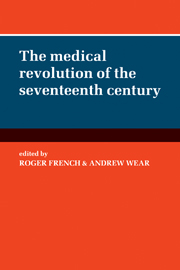Book contents
- Frontmatter
- Contents
- List of contributors
- Acknowledgements
- Introduction
- 1 Medicine, religion and the puritan revolution
- 2 Harvey in Holland: circulation and the Calvinists
- 3 The matter of souls: medical theory and theology in seventeenth-century England
- 4 Mental illness, magical medicine and the Devil in northern England, 1650–1700
- 5 Passions and the ghost in the machine: or what not to ask about science in seventeenth- and eighteenth-century Germany
- 6 Thomas Sydenham: epidemics, experiment and the ‘Good Old Cause’
- 7 The medico-religious universe of an early eighteenth-century Parisian doctor: the case of Philippe Hecquet
- 8 Isaac Newton, George Cheyne and the Principia Medicinae
- 9 Physicians and the new philosophy: Henry Stubbe and the virtuosi-physicians
- 10 The early Royal Society and the spread of medical knowledge
- 11 Medical practice in late seventeenth-and early eighteenth-century England: continuity and union
- Index
7 - The medico-religious universe of an early eighteenth-century Parisian doctor: the case of Philippe Hecquet
Published online by Cambridge University Press: 05 January 2012
- Frontmatter
- Contents
- List of contributors
- Acknowledgements
- Introduction
- 1 Medicine, religion and the puritan revolution
- 2 Harvey in Holland: circulation and the Calvinists
- 3 The matter of souls: medical theory and theology in seventeenth-century England
- 4 Mental illness, magical medicine and the Devil in northern England, 1650–1700
- 5 Passions and the ghost in the machine: or what not to ask about science in seventeenth- and eighteenth-century Germany
- 6 Thomas Sydenham: epidemics, experiment and the ‘Good Old Cause’
- 7 The medico-religious universe of an early eighteenth-century Parisian doctor: the case of Philippe Hecquet
- 8 Isaac Newton, George Cheyne and the Principia Medicinae
- 9 Physicians and the new philosophy: Henry Stubbe and the virtuosi-physicians
- 10 The early Royal Society and the spread of medical knowledge
- 11 Medical practice in late seventeenth-and early eighteenth-century England: continuity and union
- Index
Summary
INTRODUCTION: THE MAN
The eponymous hero of this chapter is unlikely to be a familiar figure to many historians of medicine of the post-Cartesian era. This is scarcely surprising for from the vantage point of the nineteenth and twentieth centuries, Philippe Hecquet (1661–1737) was just another Paris physician, indistinguishable from the large majority of the three hundred or so medical men who legally or illegally practised their craft in the French capital at the turn of the eighteenth century. Certainly, there were a number of Paris doctors at this time whose shades have been duly honoured in the medical pantheon, such as the botanist J.P. de Tournefort (1656–1708). Hecquet, however, was decidedly not of their stamp. Unlike his more prestigious colleagues, Hecquet's primary concern was with healing the sick. He was totally uninterested in helping push back the frontiers of medical knowledge by personally torturing nature to reveal her secrets. Significantly, he never presented an account of any experimental work to a learned society which he himself had performed; indeed, there is no evidence that he ever did any research.
Nevertheless, in the early eighteenth century the mention of Hecquet's name to a fellow physician, not just in Paris but in virtually any European city, would have elicited an immediate electric response. To some, like the Scot Thomas Bower, professor of mathematics at the university of Aberdeen, Hecquet was the principal physician of the French capital.
- Type
- Chapter
- Information
- The Medical Revolution of the Seventeenth Century , pp. 191 - 221Publisher: Cambridge University PressPrint publication year: 1989
- 4
- Cited by



